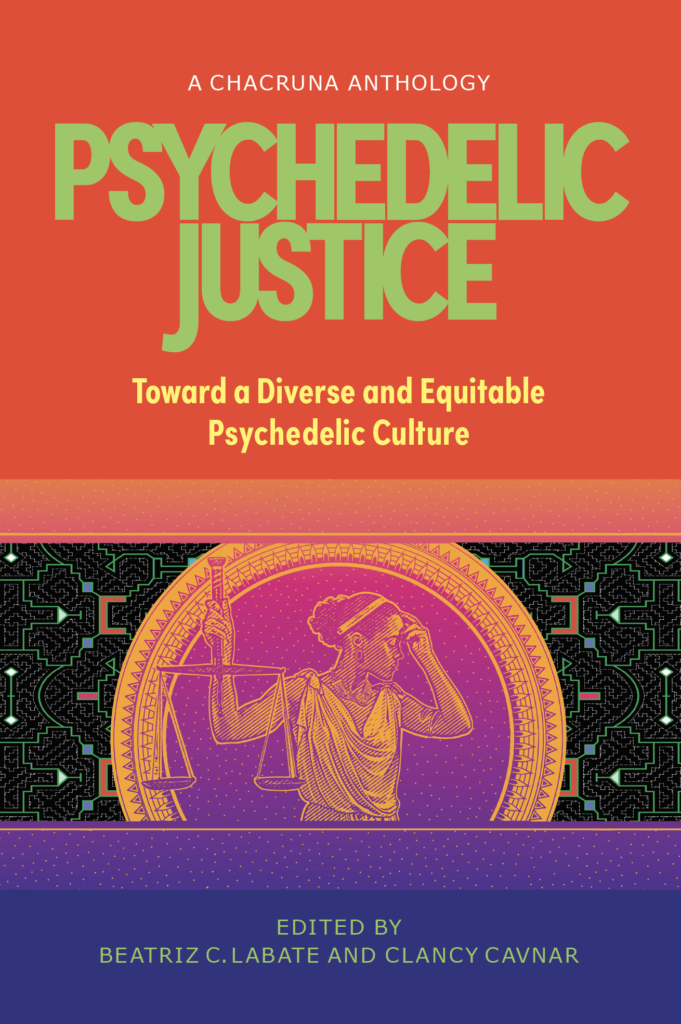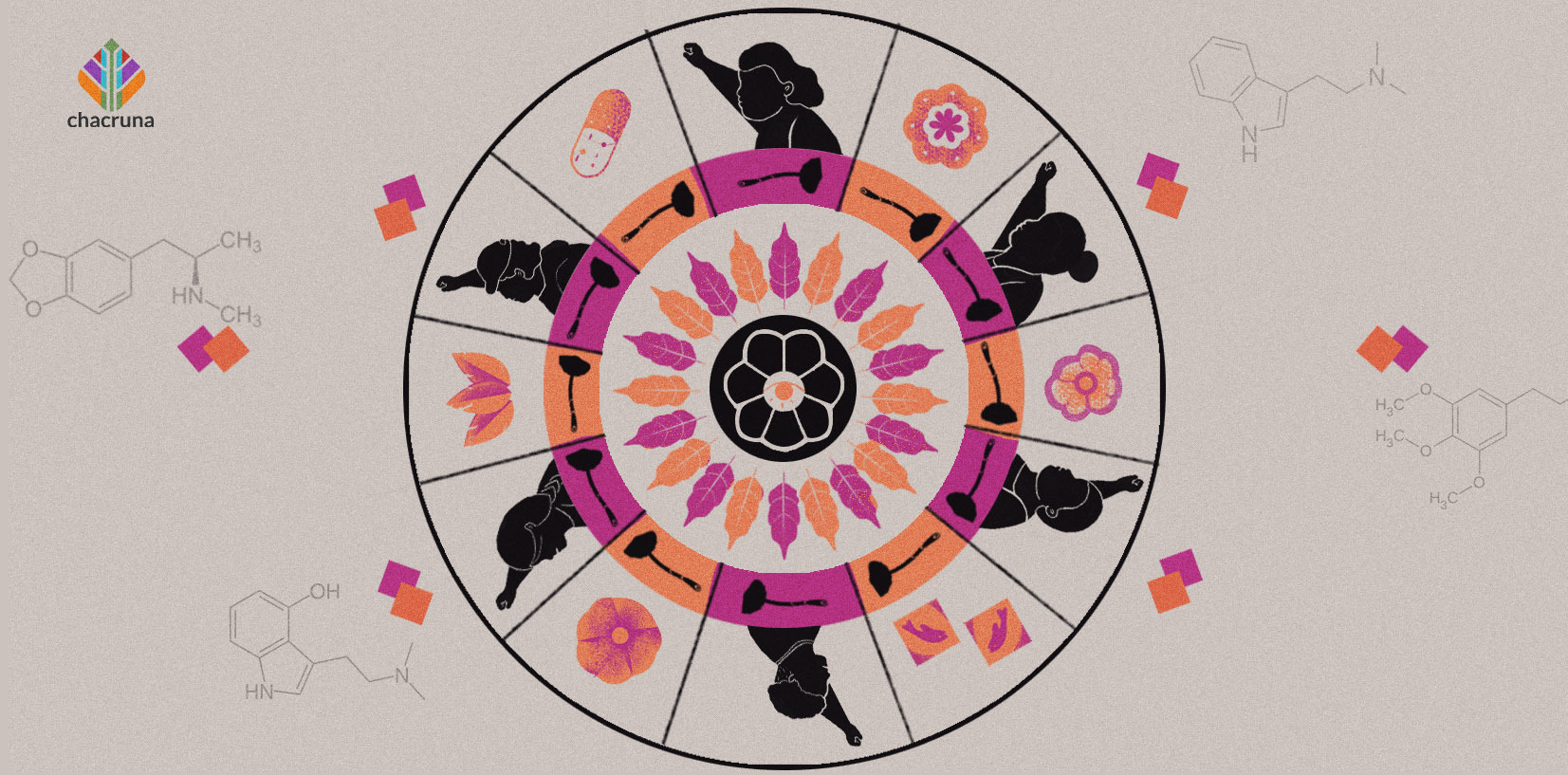On September 14, 2021, Synergetic Press published the book, Psychedelic Justice: Toward a Diverse and Equitable Psychedelic Culture. The edited anthology by Bia Labate, PhD and Clancy Cavnar, PsyD of the Chacruna Institute for Psychedelic Plant Medicines features voices that have been long marginalized in Western psychedelic culture: women, queer people, people of color, Indigenous people, and people from the Global South.
Psychedelic culture is at an inflection point. Within the last decade, psychedelics have assimilated into the mainstream, even becoming a multi-million dollar industry. As psychedelic medicine integrates into our widespread capitalist culture, the question of what forces will gain control and shape the direction of the psychedelic renaissance is front and center. In this pivotal time, with so many new players emerging, those who believe that psychedelics can transform society are being challenged to define, and embody, the values that will shape this growing movement.

“This book is a must-read for everyone in the field, especially those who believe the psychedelic community is a space of liberty and justice for all,” says NiCole T. Buchanan, PhD, clinical psychologist, author of “Psychedelic Justice: Creating a Socially Just Psychedelic Renaissance” and member of the Chacruna Institute’s Racial Equity and Access Committee. “Psychedelic Justice not only demonstrates the many ways we have failed to live up to the promise and potential of a psychedelic renaissance, but it also offers strategies to correct our course as a community and to revolutionize society.”
The essays within Psychedelic Justice examine both historical and modern issues within psychedelic communities that many may not be aware of. Radical, cultural transformation is the guiding force behind this socially visionary anthology. It guides us in cultivating a psychedelic culture that represents everyone, honors voices that have been suppressed for too long, and envisions a more beautiful tomorrow through the psychedelic lens.
“This Chacruna anthology unites authors who recognize the power of psychedelics to change the way we think. It is not just that we need to update the browser on our search engine, but rather that we need to unplug the computer altogether and look instead to different sources of information, be it from the stars, plants, or people in our communities––especially those who are different from us,” shares Erika Dyck, PhD, professor and author of “Can Psychedelics Promote Social Justice and Change the World?,” Canada Research Chair in the History of Health & Social Justice, and member of Chacruna’s Board of Directors and Associate Director of Chacruna in Canada.
In this anthology, Indigenous contributors offer their perspectives on cultural appropriation, colonialism, and globalization of plant medicines. Topics addressed also include the following: overarching perspectives about western capitalism; queer issues, including LGBTQ+ affirmative psychedelic therapy; the issue of sexual abuse in intimate healing settings; and ecological concerns such as sustainability, policy, and Indigenous reciprocity. Taken as a whole, the authors focus on justice, equity, diversity, and inclusion (JEDI) broadly and comprehensively.
As decriminalization, legalization, and medicalization of psychedelics advance in the West, relatively little has been done to address the injustices that People of the Global Majority face on any given day. “Psychedelics in the Global North are going mainstream, but many voices are being left out in the psychedelic renaissance,” shares Bia Labate, PhD, social anthropologist and the Executive Director of the Chacruna Institute. “Psychedelic Justice is a collection of essays that highlight Chacruna’s ongoing work of promoting diversity, equity, access and inclusion by uplifting voices that have long been marginalized in Western psychedelic culture. Psychedelic Justice guides us in cultivating a psychedelic renaissance that represents everyone and envisions a tomorrow whereby the revolutionary potential of psychedelics can support all, not just a few.”
This book is now available for purchase at Synergetic Press, Amazon, and other retailers: https://synergeticpress.com/catalog/psychedelic-justice/
Dr. Beatriz Caiuby Labate (Bia Labate) is a queer Brazilian anthropologist based in San Francisco. She has a Ph.D. in social anthropology from the State University of Campinas (UNICAMP), Brazil. Her main areas of interest are the study of plant medicines, drug policy, shamanism, ritual, religion, and social justice. She is Executive Director of the Chacruna Institute for Psychedelic Plant Medicines (https://chacruna.net, https://chacruna-iri.org, https://chacruna-la.org). She serves as Public Education and Culture Specialist at the Multidisciplinary Association for Psychedelic Studies (MAPS), and Adjunct Faculty at the East-West Psychology Program at the California Institute of Integral Studies (CIIS). She is also Diversity, Culture, and Ethics Advisor at the Synthesis Institute. Additionally, she is a co-founder of the Interdisciplinary Group for Psychoactive Studies (NEIP) in Brazil and editor of its site. She is author, co-author, and co-editor of twenty-four books, two special-edition journals, and several peer-reviewed articles (https://bialabate.net).
Clancy Cavnar has a doctorate in clinical psychology (Psy.D.) from John F. Kennedy University in Pleasant Hill, CA. She currently works in private practice in San Francisco and is Co-Founder and a member of the Board of Directors of the Chacruna Institute for Psychedelic Plant Medicines. She is also a research associate of the Interdisciplinary Group for Psychoactive Studies (NEIP). She combines an eclectic array of interests and activities as a clinical psychologist, artist, and researcher. She has a master of fine arts in painting from the San Francisco Art Institute, a master’s in counseling from San Francisco State University, and she completed the Certificate in Psychedelic-Assisted Therapy program at the California Institute of Integral Studies (CIIS). She is the author and co-author of articles in several peer-reviewed journals and co-editor, with Beatriz Caiuby Labate, of ten books. For more information see http://www.drclancycavnar.com.
Take a minute to browse our stock:
Did you enjoy reading this article?
Please support Chacruna's work by donating to us. We are an independent organization and we offer free education and advocacy for psychedelic plant medicines. We are a team of dedicated volunteers!
Can you help Chacruna advance cultural understanding around these substances?











